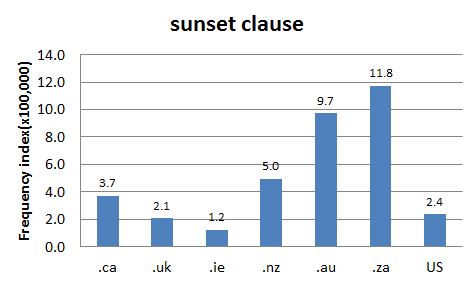DCHP-2
sunset clause DCHP-2 (December 2016)
Non-Canadianism
n. — Politics
a provision automatically terminating a government programme or law at the end of a fixed period unless they are formally renewed.
The history of sunset clauses goes back to 1789 when Thomas Jefferson argued that ''no society can make a perpetual constitution, or even a perpetual law'' (Ranchordás 2014: 18). Jefferson believed that laws should terminate after a fixed period since one generation has no right to inflict their decisions upon younger ones. Even though Thomas Jefferson wrote about 'sunsetting', the actual term sunset clause, also known as sunset law (see 1977 reference) was popularized by Colorado Common Cause founder Craig Barnes. The term was used as a 'companion concept' to sunshine law (see AHD-5) to describe a process where, unless agency and purposefulness is proven, the 'sun would set' on the regulation. The basic concept is therefore, clearly, not Canadian. However, internet domain search raises further questions, since the hits are highest for South Africa, then Australia. Surprisingly, both Canadian and American figures are very low (see Chart 1) in the international context.
In the light of this evidence a Canadian dimension remains when defining the meaning narrowly in the political context, as in .za domains the less political construction context is prevalent.
